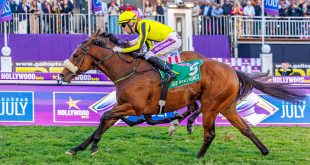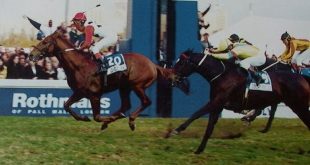Meanwhile, the ongoing relationship between Korean and South African racing is set to step up another gear after continuing negotiations and the Korean Racing Authority (KRA) have also announced that they have opened their doors to foreign owners, which provides an opportunity to race for the third highest prize money in the world .
Rice, by all accounts, became the first trainer in Korean history to have a winner with his first runner on January 24 this year and currently, after a double on October 15 from just two runners, he stands on 23 winners. However that has come from just 102 runners and has been achieved at a fantastic strike rate of 22,5%. After the October 15 meeting Rice was in 11th place on the Busan trainer’s log. However, his strike rate in this major racing centre is the third highest behind only the top two on the log, Kim Young Kwan and Peter Michael Wolsley. Rice has also had ten second places and four thirds.
The on course attendance figures in Korea are absolutely phenomenal and for example the average Sunday meeting attendance in 2010 was 192,999, although this dropped to 175,122 in 2011.
Fanatical racegoers have learnt that when a Rice horse is turned out it will be fit and well and ready to win. Rice’s success has caused the powers that be to sit up and take notice and the KRA have now requested that a South African jockey relocate on a permanent basis, although the criteria includes that he or she must have a winning percentage of at least 8%.
Furthermore, the KRA recently announced that they have opened their doors to foreign owners, meaning that South African owners would be able to buy and race horses there. However, the application in this regard is only open for a limited period and apparently closes in about two weeks time.
Korea has a Tote Monopoly and their prizemoney ranks third in the world behind only Hong Kong and Dubai. In 2012 they boasted a US$7.4-billion industry, and to put that into perspective an average weekend’s take at their three racetracks equaled that of all tracks in the United States over the same period.
The system of ownership in Korea is virtually flawless and prevents a problem trainers in South Africa face of non-paying clients. The KRA travel to foreign countries like Australia to buy horses that they believe will improve their stud book and then put them on auction in Korea. Owners that have been granted the right to race can buy these horses, but quickly lose this right if they fall behind in their payments to trainers.
South African racing and the KRA currently have a “twinning” agreement, which manifests in such events as the KRA Guineas meeting held in honour of South Korean racing at Greyville every year at the beginning the Champions Season. Opportunities have also been provided for jockeys and apprentices to be hosted on a reciprocal basis in both countries.
Vidrik Thurling, the former chairman of Gold Circle and now a director of Kenilworth Racing, was largely responsible for the forming of the bond with the KRA and for its continual strengthening.
He has revealed that there are currently ongoing negotiations between South African racing and Korean racing at the highest level that have revolved around such aspects as the swapping of television pictures with accompanying betting and paying of royalties. Further down the line there is the potential for co-mingling and there have even been discussions about the possibility of positive changes to the export protocols. Hyun Myung Kwan, who is both Chairman and CEO of the KRA, is due to attend this year’s J&B Met. These negotiations are all part of Korea’s efforts to internationalise as they evolve as a horseracing nation.
Rice’s venture was made possible when the KRA asked for a South African trainer a few years ago in order to uplift the overall quality of horsemanship among their ranks. Thurling discussed the matter with Gold Circle’s current Racing and Marketing Executive Graeme Hawkins and they identified Rice as a candidate that ticked all the boxes.
Rice’s horsemanship skills as both a trainer and an equestrian sportsman were not in question. Despite never being able to attract owners with significant buying power after relocating from Zimbabwe to South Africa in about 2005, he was able to still have winners with small strings of unfashionably bred horses.
Rice was approached by Thurling and after his positive response was flown to Korea by the KRA. Thereafter he was promised accommodation for two years plus 20 horses to start with. Gold Circle facilitated the move throughout as the red tape involved meant mountains of correspondence was required. They also helped Rice pay the deposit for the visa and work permit requirements, which was refunded by the Korean authorities after about three months.
Rice has not only had success on the race track in Korea, but has drawn further attention due to his high degree of professionalism. He is one of the only trainers in the country to have his own website. Gold Circle have followed his progress keenly and are not only delighted and proud to see the strides he is making, but also pleased that it has helped foster further potential in the relationship between South African and Korean racing.








